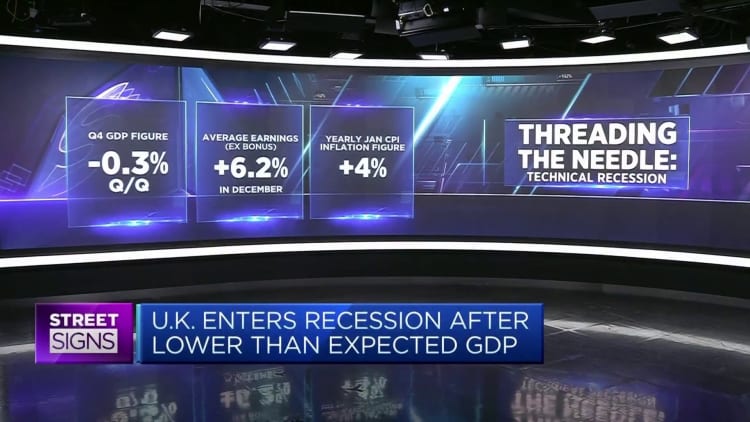British Finance Minister Jeremy Hunt said earlier this month that Britain would not fall into recession this year.
Hannah Mckay | Reuters
LONDON – Economists expect British Finance Minister Jeremy Hunt to take advantage of a small fiscal windfall to deliver a modest package of tax cuts in his spring budget on Wednesday.
Ahead of what is likely to be the Conservative government’s final budget event before the country’s upcoming general election, Hunt is under pressure to please voters as his party trails the main opposition Labor Party by more than 20 points in all national polls.
But he also must contend with the constraints of fragile public finances and a stagnant economy that recently entered a modest technical recession.
On the positive side, inflation has fallen faster than expected and market expectations for interest rates are well below the level used in Hunt’s autumn statement in November.
The Treasury pre-announced plans over the weekend to deliver up to 1.8 billion pounds ($2.3 billion) in benefits by boosting public sector productivity, including freeing up police time for more frontline work .
The Independent Office for Budget Responsibility estimates that the Treasury could save up to £20 billion a year by returning to pre-pandemic productivity levels.
Hunt will also announce £360 million in funding to support research and development (R&D) and manufacturing projects in the life sciences, automotive and aerospace sectors, the Treasury said on Monday.
But the big questions about tax cuts remain the focus of Wednesday’s statement.
Increased fiscal space
“All in all, we think Chancellor Hunt’s fiscal space has probably increased – but only slightly and nowhere near as much as in the Autumn Statement (mainly due to the fall in expected debt costs),” said Sanjay Raja, Chief economist at Deutsche Bank in a research note on Thursday.
The German lender estimates that the government’s fiscal space will have grown from around £13 billion to around £18.5 billion and that tax cuts are “very likely” the first port of call. Raja indicated that the finance minister would be cautious in easing fiscal policy and would prefer supply-side support over demand stimulus.
“Supply-side measures are more likely in our view, particularly as the Bank of England becomes more willing to ease monetary policy,” Raja said.
“As a result, the Spring Budget is more likely to see tax cuts to National Insurance Contributions (NICs) and changes to child benefit (contrary to previous expectations of income tax cuts).”
A significant cut to Social Security was the highlight of Hunt’s fall statement, although economists were quick to point out that the benefit to payers would be more than offset by the impact of existing freezes on income tax thresholds – known as “fiscal drag.” “
UK National Insurance is a tax on employee income and employer profits to pay government social security benefits, including the state pension.
Raja also noted that an extension of the government’s existing fuel tax freeze remained possible and that some spending cuts would likely serve to partially offset any easing of fiscal policy.
Overall, Deutsche Bank expects Hunt to deliver net easing of £15bn in the coming financial year, falling to around £12.5bn in the medium term.
“The outlook for public finances remains precarious. Small changes in the macroeconomic outlook could lead to large shifts in public finances. “The Chancellor continues to walk a fine line between implementing his fiscal rules now and tightening austerity later,” Raja said.
“Of course, big questions remain about public finances – including whether spending cuts or limited increases in some areas continue to be realistic to cope with the rising burden on public services and the government’s own ambitions on net zero, defense and overseas “to counteract development spending.”
Economists at BNP Paribas expect a more modest tax cuts package worth around £10 billion for the 2024/25 financial year and forecast the government will start the year with a fiscal windfall of around £11 billion.

The French bank agreed that the cuts were aimed at stimulating labor supply, with “little impact on inflation and therefore on the Bank of England”.
“Our base case is that the government will spend £10bn of the short-term fiscal windfall and use the additional medium-term fiscal space to reduce personal taxes,” said economists Matthew Swannell and Dani Stoilova in a research note titled “Saloon the last chance”. .”
They also expect the Treasury to delay the fuel duty increase in March 2024 for a further 12 months, costing £3.7 billion a year, and introduce a permanent 1p cut in the basic rate of income tax will result in costs of £3.7 billion per year and £6 billion and £7.35 billion per year.
“The overall effect of this package of measures would be to restore medium-term fiscal space to approximately where it started at £12.7 billion,” they added.
“With the Conservatives trailing in the opinion polls and the Budget potentially being the last opportunity to ease fiscal policy before a general election, we expect Chancellor Hunt to at least make further use of the additional fiscal space available to him.”
Source link
2024-03-04 06:53:56
www.cnbc.com








